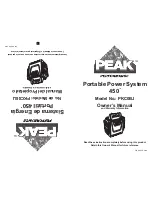
•
12
•
PROBLEM
POSSIBLE CAUSE
SOLUTION
The charger is making an
audible clicking sound.
Circuit breaker is cycling.
The battery is defective.
Shorted battery cables or
clamps.
Severely discharged, but
otherwise good battery.
Reversed connections to the
battery.
The settings may be wrong.
Check the charger settings.
Have the battery checked.
Circuit breaker cycles when
current draw is too high. Check
for shorted cables or clamps
and replace, if necessary.
The battery may not want to
accept a charge, due to a
run-down state. Allow charging
to continue until battery has a
chance to recover sufficiently
to take a charge. If more than
20 minutes, stop charging and
have the battery checked.
Shut the charger off and correct
the lead connections.
Charger makes a loud
buzz or hum.
Transformer laminations vibrate
(buzz).
Shorted Diode Assembly or
Output Rectifier Assembly (hum).
No problem, this is a normal
condition.
Have charger checked by a
qualified technician.
Short or no start cycle
when cranking engine.
No power at receptacle.
AC cord and/or extension cord
is loose.
The clamps are not making a
good connection.
Failure to wait 3 minutes (180
seconds) between cranks.
The battery may be severely
discharged.
The battery is drawing more
than the Engine Start rate.
The charger may be
overheated.
Check for an open fuse or circuit
breaker supplying the AC outlet.
Check power cord and extension
cord for loose fitting plug.
Check for poor connection at
battery and frame.
Wait 3 minutes of rest time
before the next crank.
On a severely discharged
battery, charge for 10 to
15 minutes at the LARGE
BATTERY rate, to help assist
in cranking.
Crank time varies with the
amount of current drawn. If
cranking draws more than the
Engine Start rate, crank time
may be less than 3 seconds.
The thermal protector may have
tripped and needs a little longer
to close. Make sure the charger
vents are not blocked. Wait and
try again.













































